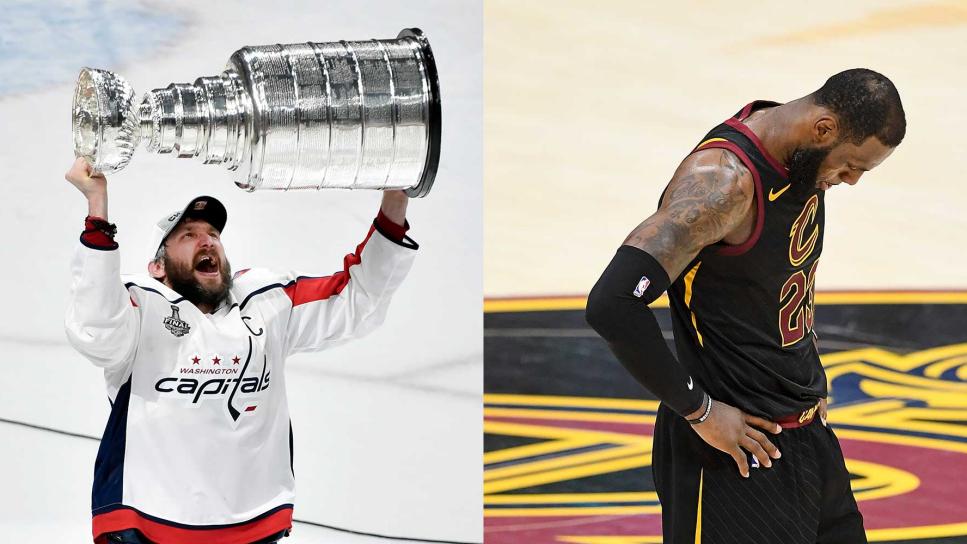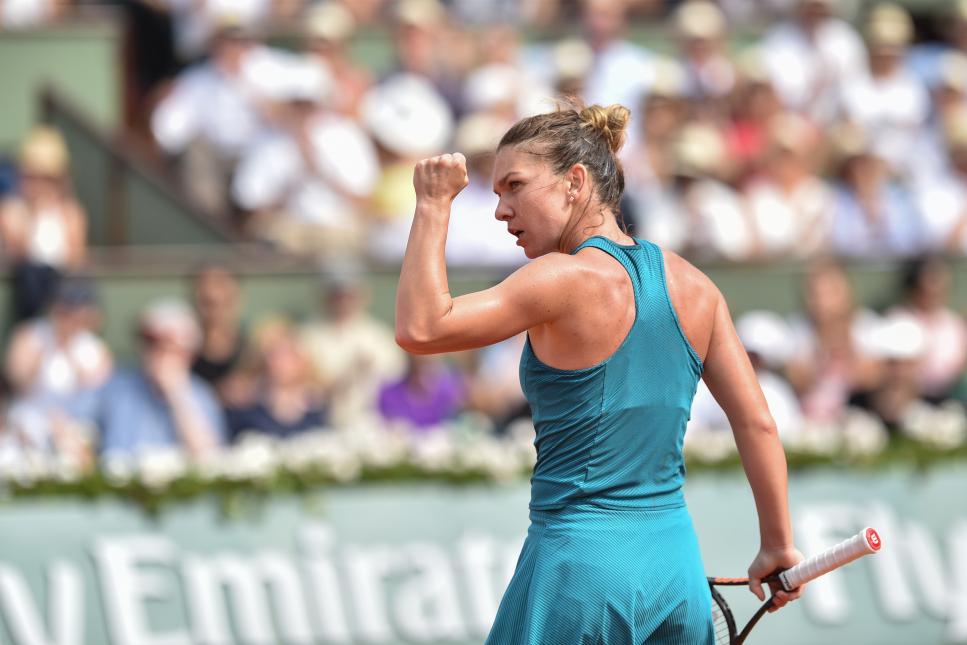News
Reaction to LeBron and Ovechkin shows how we're ruining team sports

First off, I can't take credit for this thesis. It comes from a post that went up on Reddit's NBA page after the Warriors swept the Cavs, and it's based on the oft-repeated theory (sometimes presented sincerely, sometimes ironically) that Kevin Durant ruined the NBA by signing with the Warriors and thus making the playoffs a foregone conclusion for two years and counting. What the Redditor postulated is that no, Kevin Durant did not ruin the NBA. We did.
The organizing idea is that fans and pundits have become so wrapped up in the accumulation of titles that we've placed them above literally everything else in the sport. Not only that, but we've begun to cast judgments on players based on how many titles they've won. While this rubric may apply in individual sports like golf and tennis, it's beyond inappropriate for our major team sports. Why? Because—stay with me here— they're team sports. Success depends on a collection of people, not just one individual.
But this mindset of "titles above all" pervades, and it's having an effect that goes beyond the discourse. Durant is a prime example. After losing a brutal Western Conference finals series to the Warriors in 2016, he heard the usual chorus—he's a choker, he doesn't have what it takes to win rings, he lacks heart, etc. etc.
So what did he do? He took the path of least resistance and joined the team that was already the best in the sport. He knew that his legacy would be defined by titles, whether he liked it or not, and so rather than stick it out with Oklahoma City and fight to get over the mountaintop—which would have been cathartic and amazing—he fled to Golden State and virtually guaranteed himself at least three or four rings.
Can you blame him? Can you blame a guy for getting sick of hearing the same idiotic character assessments from fans and pundits, and saying "you want rings? Fine, I'll get rings." Of course you can't.
But you can blame us.
This year, LeBron James took a very mediocre Cavs team, with a very mediocre supporting lineup, and he beat a hungry Pacers teams, swept the No. 1 team in the Eastern Conference, and reached the NBA Finals by overcoming a viciously tough Celtics team led by a coaching genius. He did this essentially on his own, with any number of heroic moments along the way. Then, in the Finals, he ran up against a super-team the likes of which should probably be illegal. He and the Cavs had no chance, but he gave it everything he had anyway, got cheated out of a win by a teammate who forgot the score, and even got so mad after that loss that he hurt his hand by punching a wall.
And what does he get for that Herculean effort, and that passion? Shit like this:
And this:
I hate that I have to say this, but Michael Jordan would emphatically NOT have led this Cavs team to a title! Michael Jordan was great, but he routinely had the best supporting cast in basketball! We need to calm down on the weird defensive nostalgia that leads us to invoke the name Michael Jordan at every opportunity!
Our mode of analysis has become so stupidly reactionary that we ignore basic reality. Does Charles Barkley think anyone else in the NBA could have taken LeBron's place and led Cleveland to a title against the Warriors? Does he think that if LeBron and Durant switched places, that Durant would have been able to overcome the Golden State Super Heroes?
Do any of us really believe that? I would hope not. But that doesn't stop us from becoming title-centric take-spouters at the drop of a hat. Starting Friday night, it's been open season on LeBron, and all because he couldn't beat the team that literally no human on earth could have beat in that same situation. It's absurd, and it's unfair.
As a corollary to this, we also need to stop expecting mental perfection of our stars. Did LeBron play at 90% instead of 100% in Game 4? I don't know, the guy still put up a 23-7-8 line. But let's say he did—who could blame him? He's down 3-0, an impossible deficit, against a team that can't be beat. If he has a letdown, that's natural. That's called being human. It's not laziness, or selfishness, or lack of heart. It's being defeated by circumstances outside of your control.
We've become so ridiculously obsessed with championships, by the way, that it has led to a secondary irony—we can't even enjoy them! This story from the New York Post about how Alex Ovechkin's first Stanley Cup doesn't make up for his "ledger of losing" is one of the worst things I've ever read. At a time when a guy who has absorbed heaps of scorn for never winning a Cup should be enjoying his ultimate triumph, this writer instead makes a series of unbelievable assumptions:
1. Winning a championship is easy.
2. Whether or not the Capitals won a championship was always up to Ovechkin. He was the team.
3. Even in a case where someone didn't perform their best under pressure, we shouldn't appreciate the story of how he evolved and overcame—we should hold up his past and use it as a weapon to delegitimize his achievement.
This is a form of madness, and it's hard to know whether capital-p Punditry is to blame, or if it's the fans who reward these kinds of snap judgments with their patronage. In either case, the effects have gone beyond mere vacuous debate. It's actually influencing the way our stars make decisions, and that influence is terrible for competitive balance.
LeBron has to decide where he's going to go this offseason. The first time he had that decision, he opted for Miami and the original super team. That yielded two titles and got everyone off his back. (Though it came with an an amazing hypocrisy, just as Durant's move did—we'll force a player to seek out a super team, but we'll also burn his jersey in anger when he does.)
Now that the situation is even worse in 2018, and the short-sighted critics are scratching at LeBron's door again, what do you think he'll decide? Will he stay with Cleveland, and try to scale the impossible cliff? Or will he go somewhere where he can have his own super team and challenge the Warriors?
Of course it's going to be the latter. And though we'll follow the drama with bated breath, the truth is that no matter who he chooses, it will render the entire 2018-19 regular season irrelevant. That's not his fault; it's ours.
The "Hey Wait, the Universe Might Not be a Cruel Indifferent Wasteland" Results of the Year: Women's Tennis
Coming into 2018, there were two semi-tragic figures in women's tennis. Caroline Wozniacki, 27 years old, had been ranked no. 1 for 18 weeks, made two Grand Slam finals and four semifinals, but had never broken through. In the meantime, she was dumped in humiliating fashion by Rory McIlroy after their engagement, and then mocked by him and Sergio Garcia. She was still a world top-five player as of this January, but there were questions about whether her style—more defensive—could actually win a Grand Slam. There were many who thought she had already missed her best chances, especially because she hadn't made a final in more than three years.

Stephane Cardinale - Corbis
Simona Halep was the no. 1 player in the world entering the Australian Open, but she too was shadowed by disappointment. Younger than Wozniacki at 26, Halep had made two finals and two semis, and had lost in heartbreaking fashion a year earlier at the French Open when she blew a one-set, 3-0 advantage against 19-year-old Jelena Ostepenko. Like Wozniacki, her defensive style raised questions about her ability to win a Slam, especially with players like Serena Williams around.
Both of them seemed to be staring down the barrel of the most agonizing career asterisk—No. 1 player in the world, zero grand slams. The dreaded "best player never to win the big one." And by failing to win in the latter stages of 2017, they had also missed a crucial window—Serena Williams was out with the birth of her first child, presenting a huge opportunity for everyone else.
Five months later, everything has changed. At the Australian, with Serena Williams still out, the two advanced to the finals after a series of agonizingly close matches. The winner would get the monkey off her back, while the loser would be subject to the added burden of being all alone in the "great career, no slams" category. Wozniacki won in a thriller, and Halep's pain compounded.
But that pain lasted only until the next Slam. This past weekend at the French, in a reversal of the 2017 final, Halep came back from a set and break down to beat Sloane Stephens in three sets and take home her first Grand Slam.
These results are like giant sighs of relief for two very well-liked, classy players and for the women's game in general. Halep said it best in the aftermath of her long-awaited slam victory: "I wanted it a lot and the pressure is gone now. For sure, I will enjoy my career and I will not stress it anymore."
And could this be a sign, at a time when there's plenty of evidence to the contrary, that the universe...might contain a speck of actual kindness?
Checks the newspaper
No. No it does not. (It's still pretty great, though.)

